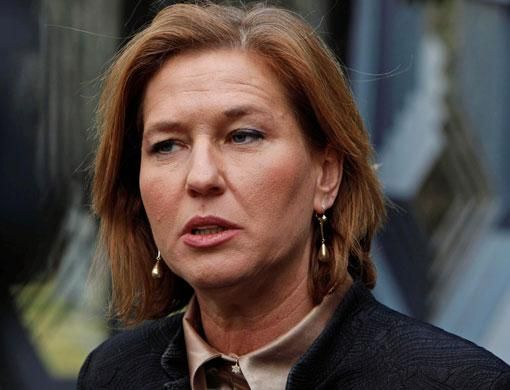Occupied Jerusalem: Kadima party leaders said it's unlikely they would heed Benjamin Netanyahu's call to join an Israeli unity government following his selection as the next prime minister.
Netanyahu was chosen by Israeli President Shimon Peres on Friday to form a government after he received support from a majority of parties in Israel's parliament.
The Likud party leader said he will try to assemble a unity government with the Kadima and Labor factions to deal with security threats, advance the peace process and achieve internal cohesion.
Foreign Minister Tzipi Livni, who heads the ruling Kadima party, said she won't join a government headed by Netanyahu in which her faction would be allied with parties opposed to moving ahead on the peace process.
Kadima won a one-seat advantage over Likud in elections Feb. 10, leaving neither with a majority in the 120-seat parliament and both in need of coalition partners. Parties that share Netanyahu's skepticism toward the peace process with the Palestinians won a majority.
The Kadima speaker of parliament, Dalia Itzik, said that if Netanyahu is willing to form a government in which "we will talk to the Palestinians, we advance the negotiations, we try to find a solution," then a broad coalition is a possibility.
"There is still a chance, though admittedly a small one," Itzik said yesterday on Israel's Channel Two news.
'Open the Door'
Kadima Interior Minister Meir Sheetrit said on Channel One news that if the government guidelines included the principle of "two states for two peoples," that would "open the door for Kadima."
Netanyahu said his first calls in trying to form his coalition would be to Livni and Defense Minister Ehud Barak, head of the Labor party. Channel One reported that Netanyahu and Livni will meet tomorrow, without citing any source.
He said the Iranian nuclear threat and the impact of the global economic crisis on Israel require "a broad unity coalition for the well-being of the state and its people."
Since election night, Netanyahu has repeatedly expressed the desire for a broad coalition including Kadima, which would give him some flexibility in managing Middle East peace efforts. If he is dependent on parties that support expanding Jewish settlements in the West Bank and oppose any concessions to the Palestinians, his coalition may collapse.
A Netanyahu-led government fell in 1999 when he agreed to give the Palestinians more control in the West Bank.
Livni opposes coalition
"The foundations have been put in place for an extreme right-wing government under Netanyahu," Livni said this week in a statement to Kadima members. "This is not our way, and we have no place in such a government."
Labor's Barak, who supports Livni's efforts to reach an agreement with the Palestinians, said Feb. 18 that his faction wouldn't recommend anyone to Peres as the next prime minister. Barak said Labor, which holds 13 seats, prefers to be in opposition given the election results.
Netanyahu and Livni will eventually form a unity government, even if the Likud leader first has to set up a more narrow coalition, said Shmuel Sandler, professor of political science at Bar-Ilan University outside Tel Aviv.
"Netanyahu is going to face big pressure from the Obama administration to at least look like he is making some movement on the peace process, and he will need Livni for that," Sandler said. "As for Livni, if she stays too long in opposition, she runs the risk that some of her Kadima colleagues who originally came from the Likud and remain ideologically close to the party might decide to bolt back there."
Myriad threats
The next Israeli government comes to power at a time when the country faces what it perceives to be a growing threat from Iran's nuclear program as well as Iranian proxy Hezbollah in the north and Hamas in the south.
Also of concern is the global economic recession. The Bank of Israel said Jan. 25 that it expects gross domestic product to contract 0.2 percent this year, the first decline since 2002, because of the worsening global economy.
Netanyahu, who as finance minister from February 2003 to August 2005 sold off state-owned companies, deregulated markets and cut the budget, has said he will cut taxes, free up government-owned land for sale and invest in technology.
The 59-year-old former commando, who has written books on global terrorism, advocates a cautious approach to Middle East peace talks and is opposed to evacuating Jewish settlements in the West Bank, which the US and the Palestinians view as obstacles to peace. He said he would first concentrate on improving economic conditions in the West Bank rather than advancing toward a final-status agreement with the Palestinians.
Partners needed
Parties totaling 65 seats in the 120-member Knesset recommended to Peres that Netanyahu be the next prime minister. Among them is Avigdor Lieberman's Yisrael Beitenu, the third- largest faction with 15 seats, which recommended to Peres that the Likud leader establish a unity government with Livni.
Netanyahu has up to 42 days to form a government with at least 61 parliamentary seats. If he fails, Peres can designate another candidate to try to set up a coalition.
Under Israel's system of proportional representation, the number of seats each party receives is determined by the percentage of the national vote it wins.













